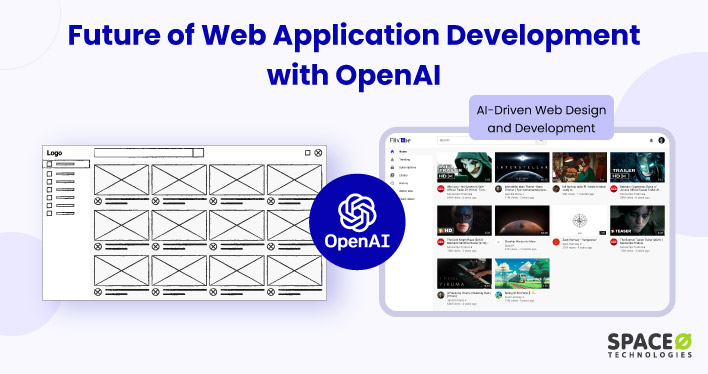- OpenAI’s advancements promise to revolutionize web app development by enabling AI-powered no-code/low-code platforms, putting greater emphasis on ethical AI, shifting towards autonomous web app maintenance, and adapting web app scalability.
- These advancements can improve web app development processes, reduce costs, and accelerate time-to-market.
Key Takeaways
If you’re curious about knowing the future implications of OpenAI especially for a web app, you have come to the right place.
As one of the leading ai app development companies, Space-O is excited to share insights into the future of web app development with OpenAI. In this guide, we will explore how OpenAI will revolutionize web app development.
So, let’s get understand 11 different ways in how OpenAI is going to change web application development.
Table of Contents
Evolution of No-Code and Low-Code Platforms
OpenAI’s advancements could lead to the further development of no-code and low-code platforms, allowing both developers and non-developers to create web apps more efficiently without extensive coding knowledge.
These platforms might use AI-powered code generation, component suggestions, and other intelligent features to streamline the development process. As a result, developers could create web apps more quickly, and businesses could reduce time-to-market for new products and services.
Here’s a tweet from Josip Grgurica which showcases how AI-powered tools like gptplosion can simplify and speed up the programming process.
Here is something for NodeJS developers 🙂
🚀 Just built a NodeJS Tic Tac Toe CLI game using the gptplosion! Generated a working code in under a minute with the power of AI. ⚡💻 Exploring the future of programming!#OpenAI #ChatGPT #NodeJS pic.twitter.com/xqggyMu8Cp— Josip Grgurica (@jkobejs) April 5, 2023
He developed the Tic Tac Toe game in Node.js by generating working code quickly and efficiently with the help of AI. This shows how easier it is for developers, including those with less experience, to create web applications.
Greater Emphasis on Ethical AI:
As AI becomes more integrated into web app development, ethical concerns, such as data privacy, bias, and transparency, may become more prominent. OpenAI’s ongoing research and focus on AI ethics could help guide the industry in developing responsible and transparent AI-powered web apps.
Developers might need to adopt best practices for AI integration, ensuring that web apps respect user privacy, prevent discrimination, and are transparent about AI-generated content and decisions.
For example:
AI Fairness 360, an open-source toolkit, can be used to examine, report, and mitigate bias in AI models to ensure that web apps respect user privacy and prevent discrimination.This shift towards autonomous web app maintenance could result in more reliable and efficient web apps, as AI-driven tools automatically identify issues, suggest fixes, and implement improvements. This approach could also reduce maintenance costs and free up developers to focus on innovation and feature development.
Shift Towards Autonomous Web App Maintenance
In the future, OpenAI’s advancements could enable AI to handle tasks such as bug detection, performance optimization, and updates, reducing the need for human intervention.
This shift towards autonomous web app maintenance could result in more reliable and efficient web apps, as AI-driven tools automatically identify issues, suggest fixes, and implement improvements. This approach could also reduce maintenance costs and free up developers to focus on innovation and feature development.
Looking to Develop an OpenAI-based Solution?
Get in touch with us. Let’s validate your idea for free and convert it into a highly performative web app.

The emergence of AI-Driven Web Design
OpenAI has the potential to enhance AI-driven web design through innovative tools. These tools can turn wireframes into complete designs, taking into account user preferences and industry best practices. As a result, the design process becomes more streamlined, efficient, and accessible to a diverse range of users.
Additionally, AI-powered tools suggest design elements, layouts, and visual themes based on user preferences, industry best practices, and accessibility guidelines. Such AI-driven design tools could analyze user behavior and feedback, continuously improving web app interfaces to maximize user engagement and satisfaction. As a result, web apps could become more visually appealing, user-friendly, and accessible to a wider audience.
For instance, OpenAI introduced DALL·E which generates more realistic and accurate images with 4x greater resolution. DALL.E creates original, realistic images and art from a text description and even combines concepts, attributes, and styles.More Focus on Cross-Platform Web App Development
OpenAI’s advancements can lead to advanced cross-platform web app development tools. These tools simplify creating apps for various devices, operating systems, and screen sizes. AI-driven tools intelligently optimize app layouts and designs for different devices like smartphones, tablets, and desktops, ensuring consistent user experiences.
For example, an AI-powered tool could automatically adapt a web app’s design to fit different screen sizes, resolutions, and orientations. It might rearrange interface elements, resize fonts and images, or adjust navigation menus for better usability on smaller screens.
These AI-driven tools can also anticipate and adapt to new devices or platforms, keeping web apps up-to-date and compatible. This adaptability results in flexible, future-proof web apps that meet users’ evolving needs in a changing technological landscape.
Integration of AI in Web App Marketing
As OpenAI’s technology progresses, AI-driven marketing tools are poised to play a more significant role in web app development. These tools can harness AI’s capabilities to analyze user behavior, understand how users interact with web apps, and identify patterns that provide insights into their preferences and needs.
By segmenting users based on demographics, interests, and in-app behavior, AI-driven marketing tools can create tailored marketing campaigns for individual users or specific user groups. These campaigns may include personalized content, offers, and recommendations, making marketing efforts more relevant and engaging for users.
For example:
AI-generated content, such as emails, push notifications, or in-app messages, can be created using natural language generation models like OpenAI’s GPT-4. This technology can generate persuasive and coherent messaging that resonates with users, increasing the likelihood of conversion and retention.Moreover, AI-driven marketing tools can optimize campaigns in real-time, continuously testing and refining messaging, targeting, and timing to maximize user engagement and conversions. This dynamic optimization can lead to more effective marketing efforts and better return on investment (ROI) for web app developers.
Increase in the Conversational UI
OpenAI’s language models, such as GPT-4, revolutionize the way users interact with web apps. Conversational UIs make web apps more interactive and engaging by replacing traditional point-and-click interfaces with more intuitive, conversation-based experiences.
Conversational UIs can be integrated into web apps in various forms, including chatbots, voice assistants, or even immersive virtual environments. These interfaces allow users to communicate with the web app through natural language input, such as typing or speaking, instead of relying on buttons or menus.
AI-generated responses powered by advanced language models enable web apps to engage in more natural and human-like conversations with users. These models can understand user input, discern context, and generate appropriate responses or suggestions, improving the overall user experience.
Some real-world examples of conversational UIs include customer support chatbots, which can answer user queries and resolve issues without human intervention. AI-powered virtual assistants, such as Siri, Google Assistant, or Alexa, help users with various tasks through voice commands.Enhances AI Collaboration
As web app development progresses, collaborations between different AI systems could become more common. This might involve the integration of OpenAI’s GPT-4 or later models with other AI technologies such as computer vision or reinforcement learning. Combining these technologies could result in the creation of web apps that offer a wider range of advanced features and capabilities.
For example, a web app might combine natural language processing, image recognition, and machine learning algorithms to provide a richer, more interactive experience for users. By harnessing the power of various AI technologies, web app developers could create innovative solutions that address complex challenges and user needs.
Wondering if Your AI-based Web App Idea Will Work?
Let’s validate your idea. With thorough research and market analysis, we can help you define your project scope and check the feasibility of your AI-based idea.
AI-driven Data Privacy and Compliance
With the growing importance of data privacy and regulatory compliance, OpenAI’s advancements can play a significant role in creating AI-powered tools. These tools can assist web app developers in adhering to data protection regulations like GDPR or CCPA.
OpenAI tools can automate the detection of privacy risks, suggest remediation actions, and assist in the implementation of privacy-by-design principles. By proactively addressing privacy concerns, web app developers could foster a safer digital environment for users, building trust and ensuring the long-term success of the web apps.
Future-ready Adaptive Web App Scalability
OpenAI’s advancements have the potential to create dynamic web app scalability solutions. These solutions can automatically adjust resources depending on user demand, ensuring optimal performance even during peak usage periods. This leads to more efficient and cost-effective web app development and maintenance.
AI-driven resource management can predict and respond to changes in user demand. By doing so, web apps stay performant and reliable. Consequently, businesses can lower infrastructure costs, allocate resources more effectively, and minimize the risk of downtime or subpar performance affecting user experiences.
For instance, during Black Friday or Cyber Monday, the e-commerce website might experience a sudden surge in user traffic. The AI-driven resource management system can predict this surge and automatically allocate more resources, such as server capacity and bandwidth, to handle the increased demand. This ensures that the website remains responsive and performant, providing a seamless user experience despite the high traffic.
After the peak demand subsides, the AI system can scale back resources to save on infrastructure costs. This dynamic and responsive approach to resource management enables web app developers to maintain optimal performance while reducing overall expenses.
Improved Natural Language Processing Capabilities
OpenAI’s advancements in natural language processing (NLP) can greatly improve the user experience of web apps. NLP can be integrated into web apps to enhance chatbots, voice assistants, search engines, and content personalization.
As OpenAI’s language models become more advanced, web apps will be able to process and understand natural language input more accurately, making them more intuitive and user-friendly. With improved NLP, web apps can provide more personalized and relevant content, and can better understand and respond to user queries and feedback.
So, you have studied the 11 ways in which OpenAI will enhance web app development. Let’s further understand frequently asked questions.
Frequently asked questions About the Future of Web App Development with OpenAI
Are there any limitations to using OpenAI in web app development?
Yes, there are 3 core limitations to using OpenAI in web app development:
- Dependency on data: AI models require large amounts of data for training, and the quality of data directly impacts the model’s performance. Sourcing relevant, high-quality data can be a challenge.
- Computational resources: Training and deploying AI models can be resource-intensive, requiring powerful hardware and potentially increasing costs.
- Model interpretability: AI models, particularly deep learning models, can be difficult to interpret and explain, which may hinder user trust and adoption.
What challenges might developers face when integrating OpenAI’s technologies into web app development?
Developers might face several challenges when integrating OpenAI’s technologies into web app development:
- Technical expertise: Integrating OpenAI’s technologies may require advanced programming and AI knowledge, which could be a barrier for some developers.
- Adaptability: Developers may need to fine-tune and customize AI models to fit specific use cases or meet user requirements.
- Integration complexity: Integrating AI components with existing web app infrastructure and technologies can be complex, particularly when dealing with legacy systems or custom solutions.
- Security: Ensuring the security of AI models and data throughout the development process can be challenging, particularly when handling sensitive user information.
- Cost management: Developers need to balance the costs associated with AI integration, such as licensing fees, computational resources, and maintenance, against the potential benefits and return on investment.
What are some examples of web app development tools that are already incorporating OpenAI’s technologies?
Examples of web app development tools incorporating OpenAI’s technologies include:
- AI-powered code editors, like Tabnine or Kite, use AI models to provide code suggestions and improve developer productivity.
- Natural language interfaces for coding, like OpenAI’s Codex API, enable developers to write code using natural language commands.
- AI-driven design tools, such as Wix ADI or Adobe Sensei, use AI to generate design elements, layouts, and visual themes based on user preferences and industry best practices.
How will OpenAI’s advancements affect web app development costs and time-to-market?
OpenAI’s advancements can have a significant impact on web app development costs and time-to-market:
- Reduces development time: AI-driven tools can streamline various aspects of web app development, including design, coding, and testing, reducing the overall development time and accelerating time-to-market.
- Improves productivity: AI-powered tools can enhance developer productivity by automating repetitive tasks, providing intelligent suggestions, and identifying issues more quickly than traditional methods.
- Lowers maintenance costs: AI-driven solutions can autonomously manage web apps maintenance tasks, such as bug detection, performance optimization, and updates, reducing human intervention and associated costs.
- Resource optimization: AI-powered web app scalability solutions can automatically adjust resources based on user demand, leading to more efficient resource allocation and cost management. However, it’s important to note that integrating AI into web app development can also entail additional costs, such as licensing fees, computational resources, and ongoing maintenance.
Developers must weigh these costs against the potential benefits to determine the overall impact on web app development budgets and timelines.
Conclusion
In this guide, you have explored the future of web app development with OpenAI and its potential impact on the industry. These advancements promise to revolutionize web app development processes and create new opportunities for both businesses and developers.
As the majority of businesses are yet to fully embrace these AI-driven technologies, now is the perfect time to grab the opportunity and collaborate with a leading web application development company like Space-O. Our expertise in OpenAI and other AI technologies ensures that we can develop innovative web solutions tailored to your business needs.
If you’re interested in leveraging OpenAI for your web app development needs, feel free to get in touch with us through the ‘Contact Us’ form. One of our sales representatives will get back to you within 48 working hours to discuss your idea.




